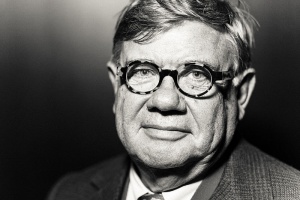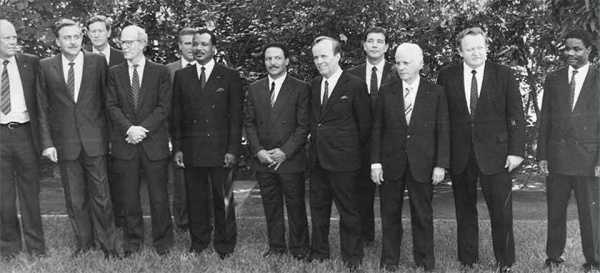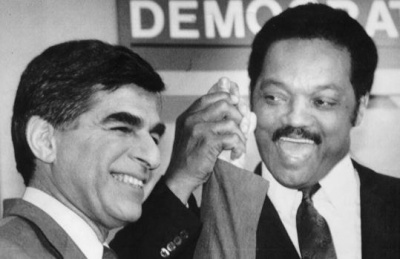Difference between revisions of "Jean-Yves Ollivier"
m (→Facilitator) |
|||
| Line 30: | Line 30: | ||
===Facilitator=== | ===Facilitator=== | ||
| − | [[File:Brazzaville_Protocol.jpg|600px|right|thumb|December 1988 in Brazzaville: [[South Africa]]n Defence Minister [[Magnus Malan]], Foreign Minister [[Pik Botha]], Head | + | [[File:Brazzaville_Protocol.jpg|600px|right|thumb|December 1988 in Brazzaville: [[South Africa]]n Defence Minister [[Magnus Malan]], Foreign Minister [[Pik Botha]], Head of Military Intelligence [[General van Tonder]], US Assistant Secretary of State for African Affairs [[Chester Crocker]], Jean-Yves Ollivier and the UN's [[Martti Ahtisaari]] ]] |
[[File:Dukakis_Jackson.jpg|400px|right|thumb|[[Michael Dukakis#Drafting the platform|Governor Michael Dukakis and Jesse Jackson agree to call apartheid South Africa a "terrorist state"]] ]] | [[File:Dukakis_Jackson.jpg|400px|right|thumb|[[Michael Dukakis#Drafting the platform|Governor Michael Dukakis and Jesse Jackson agree to call apartheid South Africa a "terrorist state"]] ]] | ||
| − | Following the May 1988 [[Ronald Reagan|Reagan]]/[[Mikhail Gorbachev|Gorbachev]] summit in Moscow, a quick succession of talks took place in London, New York, Geneva, Cairo, and Cape Verde aimed at a negotiated regional peace settlement for Southern Africa. Thanks to Jean-Yves Ollivier's influence with Congolese President [[Denis Sassou Nguesso]], the Congo's capital Brazzaville hosted the final round of negotiations between Angola, Cuba and South Africa culminating in the initialling of the [[Brazzaville Protocol]] on 13 December 1988. High profile participants in Brazzaville included South African Defence Minister [[Magnus Malan]], | + | Following the May 1988 [[Ronald Reagan|Reagan]]/[[Mikhail Gorbachev|Gorbachev]] summit in Moscow, a quick succession of talks took place in London, New York, Geneva, Cairo, and Cape Verde aimed at a negotiated regional peace settlement for Southern Africa. Thanks to Jean-Yves Ollivier's influence with Congolese President [[Denis Sassou Nguesso]], the Congo's capital Brazzaville hosted the final round of negotiations between Angola, Cuba and South Africa culminating in the initialling of the [[Brazzaville Protocol]] on 13 December 1988. High profile participants in Brazzaville included South African Defence Minister [[Magnus Malan]], Foreign Minister [[Pik Botha]], Head of Military Intelligence [[General van Tonder]], US Assistant Secretary of State for African Affairs [[Chester Crocker]], UN Under-Secretary-General for Administration [[Martti Ahtisaari]], Soviet Foreign Minister [http://en.wikipedia.org/wiki/Eduard_Shevardnadze Eduard Shevardnadze]; and, [http://en.wikipedia.org/wiki/Jean-Christophe_Mitterrand Jean-Christophe Mitterrand], Special Adviser on Africa to French President François Mitterrand.<ref>[http://www.brazzavilleprotocol.org/ "The Brazzaville Protocol"]</ref><ref>[http://www.plotforpeace.com/ "Plot for Peace Documentary"]</ref> Representatives of Angola, Cuba and South Africa signed the [[New York Accords]] at [[United Nations]] headquarters on 22 December 1988, granting independence to [[Namibia]], which had been illegally occupied by apartheid [[South Africa]] in defiance of [[United Nations Commissioner for Namibia#UNSCR 435|UN Security Council Resolution 435]]. |
[[UN Commissioner for Namibia]] [[Bernt Carlsson]] was on his way to attend the signing ceremony and take charge of [[Namibia]] but was killed when [[Pan Am Flight 103]] was sabotaged over Lockerbie, Scotland on 21 December 1988. Following the UN Commissioner's death at Lockerbie, South African foreign minister [[Pik Botha]] went ahead and signed the [[Tripartite Accord]]. However, instead of handing control of [[Namibia]] to the [[United Nations]], [[Pik Botha]] put the apartheid regime's Administrator-General, [[Louis Pienaar]], in charge. No investigation by the Scottish Police, the [[CIA]], the [[FBI]] or the [[United Nations]] has ever been conducted into the evident targeting of [[Bernt Carlsson]] on [[Pan Am Flight 103]], despite the branding of apartheid [[South Africa]] as a "terrorist state" by [[Michael Dukakis#Drafting the platform|Michael Dukakis]], the Democratic nominee in the 1988 US presidential election campaign.<ref>[http://www.nytimes.com/1988/06/13/us/dukakis-backers-agree-platform-will-call-south-africa-terrorist.html "Dukakis Backers Agree Platform Will Call South Africa 'Terrorist'"]</ref> | [[UN Commissioner for Namibia]] [[Bernt Carlsson]] was on his way to attend the signing ceremony and take charge of [[Namibia]] but was killed when [[Pan Am Flight 103]] was sabotaged over Lockerbie, Scotland on 21 December 1988. Following the UN Commissioner's death at Lockerbie, South African foreign minister [[Pik Botha]] went ahead and signed the [[Tripartite Accord]]. However, instead of handing control of [[Namibia]] to the [[United Nations]], [[Pik Botha]] put the apartheid regime's Administrator-General, [[Louis Pienaar]], in charge. No investigation by the Scottish Police, the [[CIA]], the [[FBI]] or the [[United Nations]] has ever been conducted into the evident targeting of [[Bernt Carlsson]] on [[Pan Am Flight 103]], despite the branding of apartheid [[South Africa]] as a "terrorist state" by [[Michael Dukakis#Drafting the platform|Michael Dukakis]], the Democratic nominee in the 1988 US presidential election campaign.<ref>[http://www.nytimes.com/1988/06/13/us/dukakis-backers-agree-platform-will-call-south-africa-terrorist.html "Dukakis Backers Agree Platform Will Call South Africa 'Terrorist'"]</ref> | ||
Revision as of 18:36, 21 March 2015
(spook) | |
|---|---|
 Jean-Yves Ollivier (Monsieur Jacques) | |
| Member of | Brazzaville Foundation |
Jean-Yves Ollivier (born 8 October 1944 in Algiers, Algeria) is a French businessman working primarily in the commodities sector in emerging markets.[1] In addition to his business ventures, Jean-Yves Ollivier has been active as a parallel diplomat for many years, using his personal relationships with heads of states to facilitate mediation and peace processes in Africa.[2]
In his self-promoting 2013 documentary "Plot for Peace",[3] French secret agent Jean-Yves Ollivier (pseudonym Monsieur Jacques) claims to have been instrumental in bringing the warring parties in Southern Africa to the negotiating table in December 1988 (Brazzaville Protocol), in securing Nelson Mandela's release from prison in February 1990, in organising South African President F W de Klerk's visit to France in May 1990 [4] and in the eventual dismantling of apartheid in South Africa in May 1994.[5]
Ollivier is Chairman and trustee of the Brazzaville Foundation, a UK-registered charity devoted to conflict resolution in Africa by fostering peace and stability through dialogue and understanding.[6]
Contents
Early Career
Jean-Yves Ollivier started his professional career in 1964 as an international commodities trader for Strauss Turnbull & Co (London) monitoring the South African gold mining sector. He then worked (1966-1969) for JA Goldschmidt SA in Paris, where he managed the grain trade (notably the African market). It is in this period that he started to regularly travel to Africa.
In 1970, he was hired by Grainex SA, where he quickly acquired important responsibilities.[7]
In 1975, he founded his first company, Arinco Group. In 1980, he was chosen to represent several French companies (including Thomson CSF) who were looking to invest in Africa, and started his own oil trading company, Vitank, in association with Henk Vietor, Peter de Savary and Arhmed Mannai.
In 1986 he was appointed director of Charbons de France, a French company specialised in coal trading. In 1994, he created Gestilac SA, and in 2002, PanAf Consultancy GmbH (Zurich) and Pan Africa Consulting(Hong-Kong). He later merged the three companies into one holding corporation: the Fort Group.
In 2009, he closed the sale of 25% of offshore Marine XII in Congo Brazzaville waters from ENI and SNPC to London-based company New Age.[8]
Parallel diplomacy
Hostage negotiator
In the 1980s, Jean-Yves Ollivier was appointed adviser on African affairs to then Mayor of Paris, Jacques Chirac, continuing in that role when Chirac became Prime minister in 1986.[9] Jacques Chirac asked him to undertake a secret mission to free four French hostages held in Lebanon (Marcel Fontaine, Marcel Carton, Jean-Paul Kaufmann and Michel Seurat).
Prisoner exchange
On 7 September 1987, on the tarmac of Maputo airport, Mozambique, 133 Angolan soldiers and 50 SWAPO independence fighters from Namibia were freed by South African authorities in exchange for South African Captain Wynand DuToit. DuToit had been captured 2 years earlier in Angola while he and his men were trying to sabotage oil infrastructure in Cabinda, during what has been called Operation Cabinda. Jean-Yves Ollivier secretly negotiated this large-scale prisoner exchange, which also led to the liberation of two anti-apartheid militants who were being held in South Africa, Frenchman Pierre-Andre Albertini and Dutchman Klaas de Jong.[10]
Facilitator

Following the May 1988 Reagan/Gorbachev summit in Moscow, a quick succession of talks took place in London, New York, Geneva, Cairo, and Cape Verde aimed at a negotiated regional peace settlement for Southern Africa. Thanks to Jean-Yves Ollivier's influence with Congolese President Denis Sassou Nguesso, the Congo's capital Brazzaville hosted the final round of negotiations between Angola, Cuba and South Africa culminating in the initialling of the Brazzaville Protocol on 13 December 1988. High profile participants in Brazzaville included South African Defence Minister Magnus Malan, Foreign Minister Pik Botha, Head of Military Intelligence General van Tonder, US Assistant Secretary of State for African Affairs Chester Crocker, UN Under-Secretary-General for Administration Martti Ahtisaari, Soviet Foreign Minister Eduard Shevardnadze; and, Jean-Christophe Mitterrand, Special Adviser on Africa to French President François Mitterrand.[11][12] Representatives of Angola, Cuba and South Africa signed the New York Accords at United Nations headquarters on 22 December 1988, granting independence to Namibia, which had been illegally occupied by apartheid South Africa in defiance of UN Security Council Resolution 435.
UN Commissioner for Namibia Bernt Carlsson was on his way to attend the signing ceremony and take charge of Namibia but was killed when Pan Am Flight 103 was sabotaged over Lockerbie, Scotland on 21 December 1988. Following the UN Commissioner's death at Lockerbie, South African foreign minister Pik Botha went ahead and signed the Tripartite Accord. However, instead of handing control of Namibia to the United Nations, Pik Botha put the apartheid regime's Administrator-General, Louis Pienaar, in charge. No investigation by the Scottish Police, the CIA, the FBI or the United Nations has ever been conducted into the evident targeting of Bernt Carlsson on Pan Am Flight 103, despite the branding of apartheid South Africa as a "terrorist state" by Michael Dukakis, the Democratic nominee in the 1988 US presidential election campaign.[13]
Honours
In 1987, Jean-Yves Ollivier received the Order of Good Hope from Foreign Minister Roelof “Pik” Botha. In 1995, he was elevated to the grade of Grand Officer of the Order of Good Hope by South African President Nelson Mandela for his role in ending the Apartheid. Jean-Yves Ollivier is the only French non government affiliated individual so far to have received this distinction.[14]
Jean-Yves Ollivier also holds the title of “Chevalier de la Légion d’honneur” and “Chevalier de l’Ordre National du Mérite” in France, as well as the title of “Commandeur de l’Ordre de Mérite Congolais” in Congo Brazzaville, and “Grand Officier de l ‘Étoile d’Anjouan” in Comoros.[15]
References
- ↑ "Jean-Yves Ollivier" Huffington Post
- ↑ The Huffington Post: "Plot for Peace: The Untold Story Behind South Africa's History" 18 June 2013.
- ↑ "Plot for Peace" Official Trailer
- ↑ "De Klerk Meets Mitterrand on European Tour"
- ↑ "Apartheid was doomed for economic not moral reasons"
- ↑ "The Brazzaville Foundation"
- ↑ "Official Biography"
- ↑ "L'énergie d'avancer"
- ↑ "Atlantico"
- ↑ "Relations Internationales"
- ↑ "The Brazzaville Protocol"
- ↑ "Plot for Peace Documentary"
- ↑ "Dukakis Backers Agree Platform Will Call South Africa 'Terrorist'"
- ↑ "Africa Intelligence"
- ↑ "Who's Who"
Wikipedia is not affiliated with Wikispooks. Original page source here
